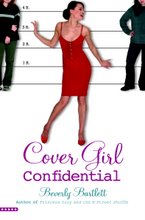Do I get Springsteen?
A natural worry for any first time novelist – at least for any worry-wart first time novelist like myself – is that people will assume that any remark made in the book, by any character, actually reflects the opinion of the author.
After all, the author wrote it right? It must reflect her opinion in some way!
Of particular concern to me is what people will assume about my understanding of Bruce Springsteen lyrics. Will they think I believe the song Cover Me is truly about sun protection? Could I really believe that the album Greetings from Asbury Park is all about vacation planning? Do I think Springsteen cares what color ball gown a princess wears? Surely not.
I guess, however, that I do worry that people will underestimate my appreciation of Springsteen. They will think that because I’m writing about silly, spoiled people and their silly, spoiled reactions to his song, that I think the songs are truly trivial or at least easily misinterpreted.
I do not. I have been known to describe Springsteen as a modern day “prophet.” And while I hesitate to actually put such lofty praise in writing, I do think he has an amazing ability to sum up our nations problems and throw them back at us in moving and meaningful way. When he sang “Devils and Dust” at the Grammies, I was touched again by his summing up of a fairly complicated position on the Iraq war – one that doesn’t demonize anyone or any political position. But simply asks some tough questions. “What if what you do to survive kills the things you love?” What indeed?
When I was a small town high school student with dreams that went beyond the county line, Springsteen spoke to me with his songs about moving on to new places to find a promised land. Of course, kids finding meaning in rock songs is nothing new. But what is different, I think, is that when I listen to those songs now – older, happier, in something that very much resembles the promised land I was looking for, the songs still speak to me. To some extent, they speak to me by simply reminding me how far I’ve come. But it’s more impressive that they speak to me in other ways. There are the political statements and the economic statements, of course. But there is also this: The things he wrote when he was in his early 20s about growing older, still seem right when you’re in your extremely late 30s and growing older. How did he know? And does that qualify him as a prophet?
A natural worry for any first time novelist – at least for any worry-wart first time novelist like myself – is that people will assume that any remark made in the book, by any character, actually reflects the opinion of the author.
After all, the author wrote it right? It must reflect her opinion in some way!
Of particular concern to me is what people will assume about my understanding of Bruce Springsteen lyrics. Will they think I believe the song Cover Me is truly about sun protection? Could I really believe that the album Greetings from Asbury Park is all about vacation planning? Do I think Springsteen cares what color ball gown a princess wears? Surely not.
I guess, however, that I do worry that people will underestimate my appreciation of Springsteen. They will think that because I’m writing about silly, spoiled people and their silly, spoiled reactions to his song, that I think the songs are truly trivial or at least easily misinterpreted.
I do not. I have been known to describe Springsteen as a modern day “prophet.” And while I hesitate to actually put such lofty praise in writing, I do think he has an amazing ability to sum up our nations problems and throw them back at us in moving and meaningful way. When he sang “Devils and Dust” at the Grammies, I was touched again by his summing up of a fairly complicated position on the Iraq war – one that doesn’t demonize anyone or any political position. But simply asks some tough questions. “What if what you do to survive kills the things you love?” What indeed?
When I was a small town high school student with dreams that went beyond the county line, Springsteen spoke to me with his songs about moving on to new places to find a promised land. Of course, kids finding meaning in rock songs is nothing new. But what is different, I think, is that when I listen to those songs now – older, happier, in something that very much resembles the promised land I was looking for, the songs still speak to me. To some extent, they speak to me by simply reminding me how far I’ve come. But it’s more impressive that they speak to me in other ways. There are the political statements and the economic statements, of course. But there is also this: The things he wrote when he was in his early 20s about growing older, still seem right when you’re in your extremely late 30s and growing older. How did he know? And does that qualify him as a prophet?

No comments:
Post a Comment